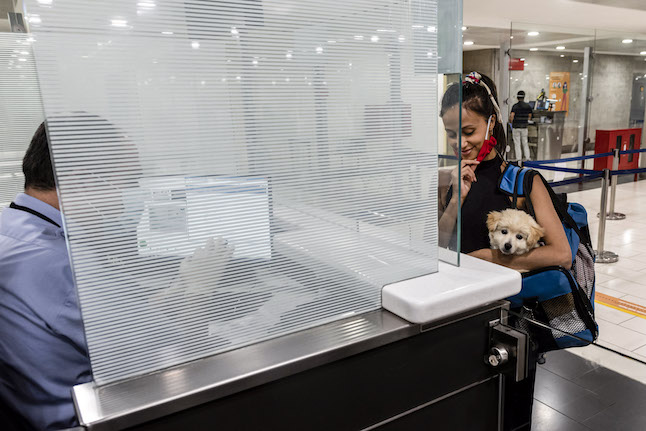The short answer is yes, you can bring your pet from the US into Spain, however you must be prepared for a lot of different rules and paperwork.
Anyone bringing an animal into Spain from outside the EU faces lots of different documents to fill out, as well as several veterinary checks, vaccination and health certificates to get. Once you’re in the EU however, travel within the Bloc is much simpler thanks to the EU Pet Passport scheme – but the exact rules vary from country to country.
Here are the requirements if you’re bringing an animal from the USA to Spain.
What type of animals are allowed?
Not all animals are considered to be pets, whether they live with you as one or not.
The US Department of Agriculture (USDA) and EU authorities, including Spain, define a pet as a privately-owned companion animal not intended for research or resale and includes the following animal groups only: dogs, cats, ferrets, rabbits, rodents, hedgehog/tenrecs, reptiles, amphibians and pet birds (non-poultry).
If your animal is not one of the types listed above or is considered poultry, it does not qualify as a pet, and is subject to different rules.
Note, that if you own one of the following breeds, they must be registered by the American Kennel Club under special rules. They must also be registered within three months of entering Spain on the Spanish side and must wear a muzzle to pass through security. These are Staffordshire terrier, American Staffordshire Terrier, Pit Bull Terrier, Dogo Argentino, Brazilian Mastiff, Rottweilers, Tosa Inu and Akita Inu.
The rules
The following requirements are necessary for travel into Spain with your pet. Be aware, you can only travel with a maximum of five pets.
- The animal must be at least 12 weeks old as this is the age at which a rabies vaccine can be given.
- Your pet must be identified by a microchip (standard ISO 11784 or annex A ISO standard 11785) or a tattoo. In case of identification with a tattoo, the tattoo must be clearly readable and applied before July 2011.
- Your pet must have a valid rabies vaccination. If it is their first vaccination against the virus, you must wait 21 days between the last shot of the vaccination before entering Spain.
- You must get a health certificate from your veterinarian, which is endorsed by USDA.
- The official health certificate will be issued by an USDA accredited veterinarian and endorsed by the Animal and Plant Health Inspection Service (APHIS).
- You can find a State-by-State list of USDA offices here.
- USDA endorsement is required for all certificates except those issued by military veterinarians for dogs, cats and ferrets.

How long is the certificate valid?
The official health certificate will be valid for 10 days, from the date of endorsement until the date of arrival in Spain – or any EU port of entry. For maritime travel, the 10-day window is extended for a period equal to the duration of the voyage.
This certificate continues to be valid for the purpose of further movements within the EU for up to four months from its date of issue.
Entering Spain
Accompanied pets entering Spain by air from the United States must do so at Border Inspection posts at international airports in Madrid, Barcelona, Malaga, Valencia or Tenerife de Sur only.
If arriving by boat, the ports approved for the import of pets are Algeciras, Almería and Santa Cruz de Tenerife.
Pets can travel in the cabin, as checked baggage or air cargo, however you must check the rules with your individual airlines as some may vary.
Quarantine
Pets do not need to quarantine, as long as all entry requirements are met.
Other pets
If your pet is not one of the usual pets such as a dog, cat or ferret and is something such as a turtle or a parrot, you may need to verify that it is not protected under the Convention of International Trade of Endangered Species of Wild Fauna and Flora (CITES). If it is, you may need an extra permit.
If you are travelling to Spain with a bird then there are additional rules, as well as the ones above on health certificates.
- You must also have an Owner’s Declaration certificate
- Your bird must have undergone isolation for 30 days prior to travel
- Or it must have two vaccine doses against avian flu between 60 days and six months prior to entering Spain
- Or it must have undergone 10 days of isolation and have been tested for the H5N1 virus
- Or it must be quarantined upon arrival in Spain in a registered facility
The paperwork
The application and declaration form required for entry into Spain can be downloaded here.
Heading back to America
Remember, that if you’re staying in Spain temporarily, you’ll need to take your pet back into the US from Spain – and there are several rules and documents to fill out there too.



 Please whitelist us to continue reading.
Please whitelist us to continue reading.
Member comments